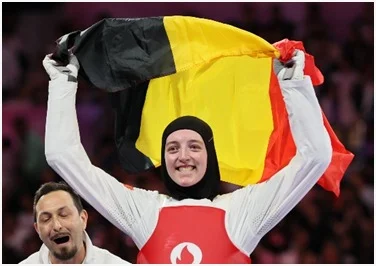In a historic achievement at the Paris 2024 Olympics, Sarah Chaâri, a 19-year-old taekwondo athlete, became the first veiled Muslim woman to win an Olympic medal, earning a bronze in the women’s -67kg category. Representing Belgium, Chaâri secured her place in Olympic history by defeating Uzbekistan’s OzodaSobirjonova in a tense three-round match, winning 2-1.
The young champion’s journey to the podium was anything but easy. On August 9, she began by overcoming Madelyn Andrea Rodriguez from the Dominican Republic in the first round, followed by a decisive victory over Egypt’s AyaShehata, which secured her spot in the semi-finals. Despite a valiant effort, Chaâri fell to Hungary’s Viviana Márton in the semi-final, who advanced to the gold medal match against Serbia’s Aleksandra Perišić.
Born in Charleroi, Belgium, to a Moroccan father and a Belgian mother, Sarah Chaâri’s achievements have made waves both in the sports world and beyond. Already a decorated athlete, she clinched the world championship title in Guadalajara, Mexico, in 2022, and later claimed the European title in Belgrade, Serbia, in May of this year. Chaâri’s impressive accomplishments are further underscored by her commitment to her studies—she is currently a full-time medical student at the Universitélibre de Bruxelles.
One aspect that sets Chaâri apart is her decision to wear a headscarf during competitions, a move that has sparked discussions, especially as the French delegation expressly forbids its athletes from doing so at the Olympic Games. “Some strong athletes cannot even participate simply because they wear a religious symbol,”Chaâri shared with De Standaard. “And they could mean a lot to France. I think it’s great that, as a Belgian, I can. We are allowed to express what we stand for.”
[Read more on radiancenews.com]


